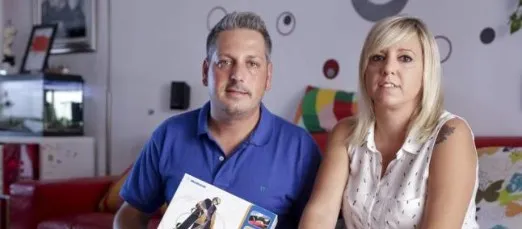Julio is only four years old and when he was a baby, he was diagnosed with diabetes.From this course he will run out of the Educational Technical Assistant (ATE) that helped him at school, with which he did last year.
In return, a nurse has granted him who, instead of staying with him during the time he is in school, accompanies him for an hour and a half, says the father of the child, Julio Rodríguez.A time that considers "insufficient" and that asks to be extended at seven hours that passes in the center.
At your young age you already have to carry a small bomb that injects insulin every 10 minutes."It's like a small mobile phone of those that we had," Rodríguez recalls."He puts a droplet every time for 24 hours."
To try to solve the problem in class, it has gathered with health and education, which have offered these conditions.However, it is not satisfied.Therefore, he has started a request for the Change.org platform, where he has collected more than 1,800 signatures.
He also acknowledges that they have assigned an ATE to school, but it is not exclusive to their little one, but is shared."If another child has a problem, you have to go help you," Rodríguez laments.
On the other hand, he appreciates that in his school he has "overturned one hundred percent, both the teaching staff and the address", since they did courses to deal with these types of cases.Even so, remember that "the tutor has 23 children" and believes that problems can arise if any urgency occurs.
Among the work that the child's caregivers have to fulfill is to control their sugar levels, and have already taken some scare."Maybe we have found 34 sugar and I was playing, because it can more than anything."They ensure that it is between 80 and 150 milligrams per deciliter of blood."We have also caught him much higher, between 400 or 500," says the father.
The child was diagnosed with this disease at nine months, and with a year and a half he already carried the bomb that provided insulin."It's very hard," says the father in tears.
As for the Department of Health, the Director of Primary Care Nursing, Maria Antònia Font, says that in a meeting with education "we agreed that this child needs a series of hours of ATE and a nurse, but part -time."The justification they give is that "it could be complemented with the surveillance of teachers."
The nurse's task, according to the director, is concentrated in two hours of greater risk, half an hour more than the father says.A time that they consider enough, and does not believe that it is not justified to monitor him for seven hours.He assures that this falls to the teaching staff, who has the training but, according to Rodríguez, cannot be concentrated on a student when there are another 20.
In addition, he emphasizes that "the father approved the plan, but continues to demand more hours of ATE."The problem that Font identifies is that the hours of the auxiliary with him have been reduced.
From the beginning of the course, Health says that he will see "how the child behaves in the educational center until the end of September and then we will give the resources" according to their needs, in reference to the nurse.






